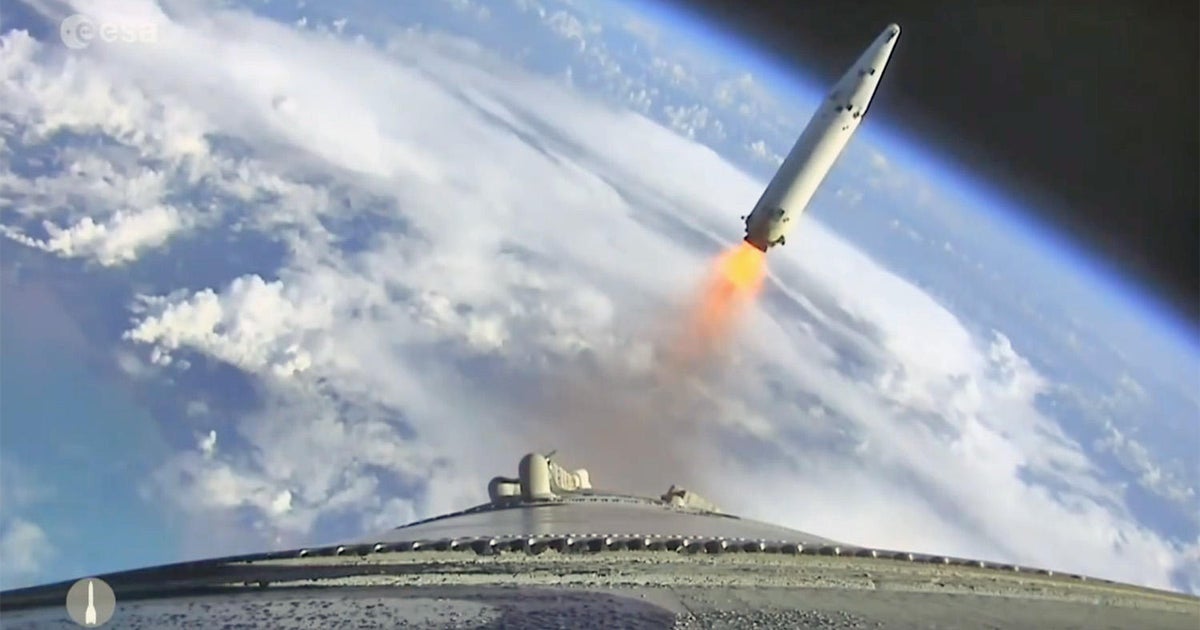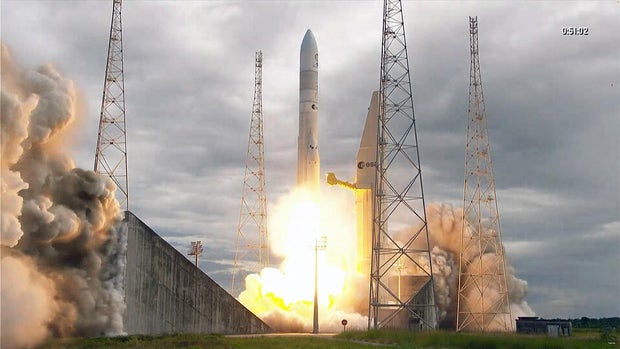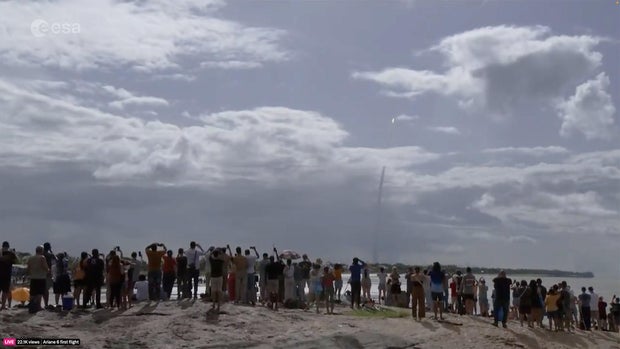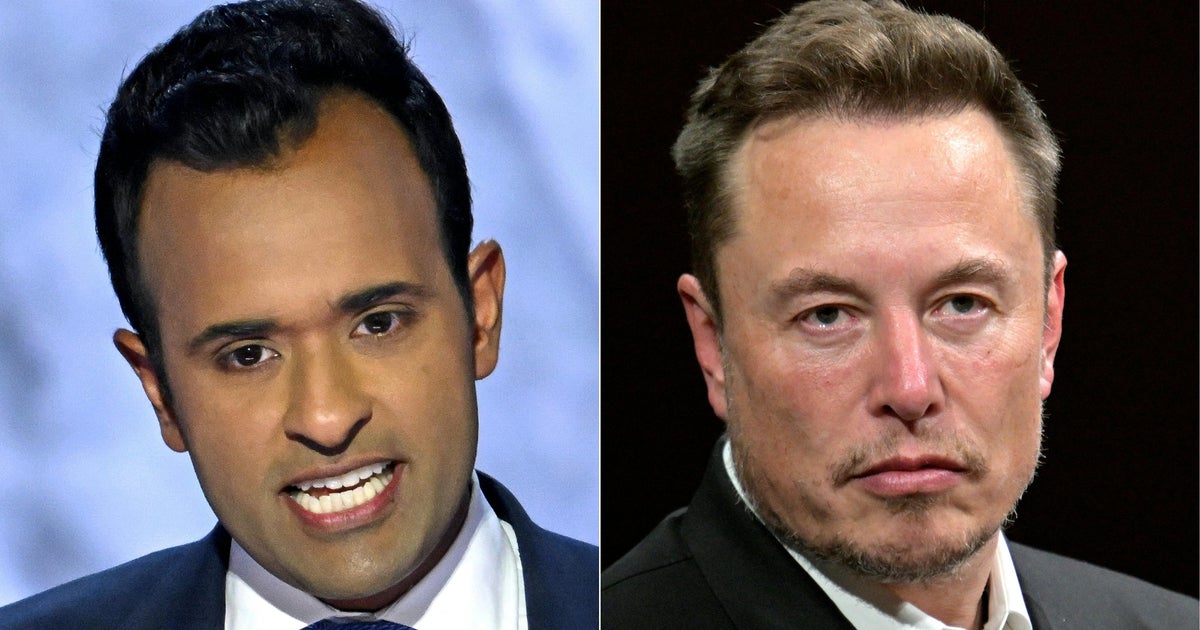CBS News
Europe launches maiden flight of Ariane 6 rocket

Running years behind schedule, Europe’s new Ariane 6 rocket blasted off on its maiden flight Tuesday, thundering away from the European Space Agency’s jungle launch site in French Guiana in a bid to restore independent European access to space.
Facing increasingly stiff international competition, Europe’s space agencies see the Ariane 6 as critical to re-establishing and maintaining their foothold in low-Earth orbit and beyond, launching European military satellites, science missions, navigation and communications satellites and other commercial payloads.
ESA webcast
“Ariane 6 will power Europe into space,” ESA Director General Josef Aschbacher said in a post on X. “This is just the first step, we have lots of work to do yet, but we are laser-focused on changing the future of the European space transportation ecosystem.”
Despite cloudy weather and area showers, the 183-foot-tall rocket’s hydrogen-fueled Vulcain 2.1 main engine roared to life at 3 p.m. EDT, followed a few seconds later by ignition of two solid-fuel strap-on boosters, each one generating 787,000 pounds of thrust.
The Ariane 6 majestically climbed skyward atop a combined 1.9 million pounds of thrust, shattering the afternoon calm at the Guiana Space Center and putting on a spectacular, long-awaited show for government and industry dignitaries, launch site personnel and area residents.
Disappearing behind low clouds, the two strap-on boosters burned out and fell away two minutes after liftoff. The Vulcain 2.1 main engine, producing 308,000 pounds of push, continued firing for another five minutes before it, too, shut down and the stage fell away, plunging back into the atmosphere where it was expected to break up.
ESA webcast
The rocket’s second stage then continued the climb to space. After two firings of its restartable, hydrogen-fueled Vinci engine, the upper stage reached its planned 360-mile-high initial orbit one hour after takeoff.
For its maiden flight, the Ariane 6 carried multiple small payloads provided by ESA, NASA, industry, research institutes and students. Among nine deployable satellites were two small experimental re-entry capsules designed to test new heat shield technologies, and two NASA “cubesats” built to study radio waves emitted by powerful solar flares.
Three upper stage engine firings were planned over the course of the two-hour 40-minute mission.
Assuming telemetry confirms a successful maiden flight, a second launch is planned before the end of the year. Six flights are booked for 2025, eight flights in 2026 and 10 in 2027. After working off the current backlog, the European space managers expect to maintain a “steady state” of nine launches per year.
“What a giant leap forward for @ESA with the first launch of its powerful, next-generation rocket-and with a @NASASun scientific instrument onboard,” NASA Administrator Bill Nelson said in a post on X. “Together with our international partners, we are leading a new era of space exploration.”
The Ariane 6’s launching marked a major milestone for the 13-nation European Space Agency, prime contractor ArianeGroup, the French space agency CNES, which built the launch pad, and Arianespace, the consortium that sells and manages Ariane flights.
The rocket’s predecessor, the venerable Ariane 5, was retired last year after 117 flights, including the 2021 launch of the James Webb Space Telescope. The Ariane 6 is roughly comparable to the Ariane 5, but uses upgraded components and is expected to cost 40% less to build and operate.
But unlike SpaceX, which dominates the current launch market with reusable first stages and payload fairings, the Ariane 6 is fully expendable and no components are recovered. Toni Tolker-Nielsen, ESA director of space transportation, recently told Space News that “our launch needs are so low that (reusability) wouldn’t make sense economically.”
“We don’t really need it at this point,” he said. “But when we’ll launch frequently in the future, we’ll need reusability for economic reasons. The second reason to have reusability for a European launcher is sustainability. We must have a circular economy in 10 or 20 years, we need to be sustainable.”
ESA webcast
The Ariane 6 originally was expected to fly in 2020, but a series of economic and technical hurdles combined to delay the maiden flight by four years.
In the meantime, a joint program with the Russian space agency Roscosmos — launching medium-lift Soyuz rockets from French Guiana — fell apart after Russia’s invasion of Ukraine. Adding insult to injury, Europe’s small Vega-C rocket was grounded after its second launch ended in failure.
And so, since the Ariane 5’s final flight last July, Europe has not had its own rockets to launch European payloads. Indeed, at least four satellites originally slated to fly aboard European launchers were instead carried to orbit aboard SpaceX Falcon 9 rockets.
“You don’t want to depend on anybody, and that’s why all spacefaring nations want their own access to space,” Lucia Linares, director of space transportation strategy and institutional launches for ESA, said in remarks quoted by Nature magazine.
Two variants of the Ariane 6 are planned: one with two strap-on boosters, the Ariane 62, and a more powerful version, the Ariane 64, with four strap-on boosters. A variety of payload fairings are available to accommodate different payload sizes.
Tolker-Nielsen said this “modular” system is ideal from Europe’s perspective.
“It’s a perfect system because Ariane 62 is replacing the Russian Soyuz, and Ariane 64 is replacing Ariane 5,” he said. “So it covers all our needs. Ariane 6 could be the European workhorse for the next 15 to 30 years.”
CBS News
A new generation of shopping cart, with GPS and AI

Watch CBS News
Be the first to know
Get browser notifications for breaking news, live events, and exclusive reporting.
CBS News
“All hands on deck” for Idaho’s annual potato harvest

Watch CBS News
Be the first to know
Get browser notifications for breaking news, live events, and exclusive reporting.
CBS News
Taste-testing “Sandwiches of History” – CBS News

Watch CBS News
Be the first to know
Get browser notifications for breaking news, live events, and exclusive reporting.










